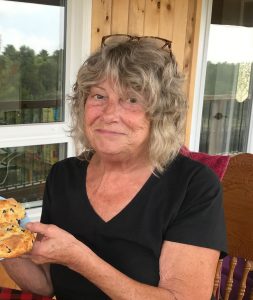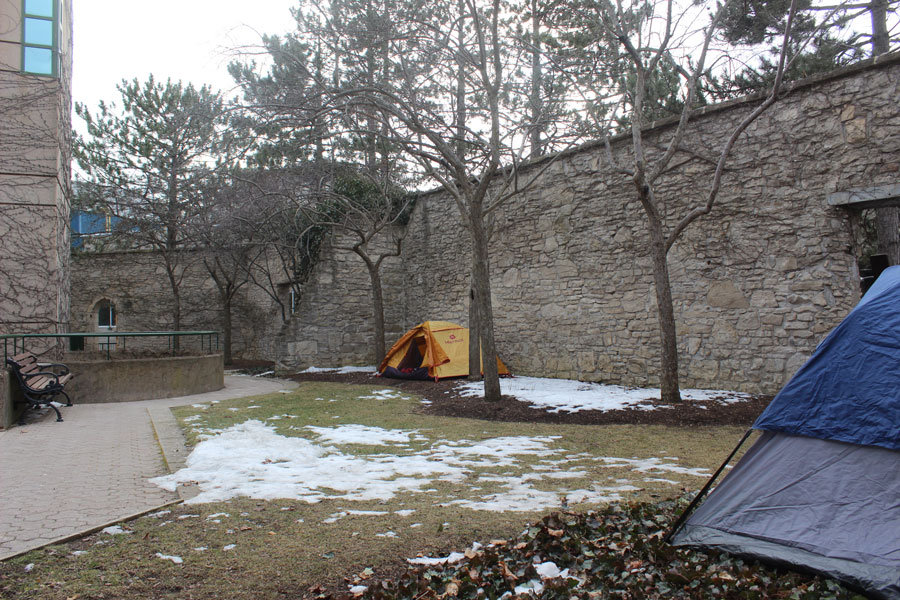GUELPH – Health care is an essential part of addressing the homelessness crisis, and the County of Wellington worked to highlight this during its recent symposium.
Wellington County social services administrator and symposium organizer Luisa Artuso said over 100 people attended the event, including “local decision makers, key service providers, and people with lived experience.”
The invite-only event was held at Guelph’s Delta Hotel during the last two days of January.
‘Lived experience’
For Artuso, including people with lived experience was critical.
That’s why the event was closed to media and the public, she told the Advertiser: to help people with lived experience feel safe to fully participate.
Artuso said 13 “people with lived/living experience” from Wellington County and Guelph attended the symposium.
They included Maggie Phelan and Jason Schwartzentruber, who have been homeless, and Michelle Fitt, who lives in social housing.
The county designated 10 seats for people with lived experience and hired a consultant to guide the process of including those participants, who were nominated by community partners, Artuso explained.
“The county was asking service providers to nominate people that they thought would have a good message for the symposium,” Phelan said.
She attended to advocate for homeless people, particularly those who aren’t in a position to talk publicly.
Phelan is the co-chair of Community Voices, a Guelph/Wellington Poverty Elimination task force working group, and also the food programs coordinator at the Guelph Neighbourhood Support Coalition.
She says it’s essential to go beyond a “one-size-fits-all” approach when finding solutions to homelessness.
When Phelan was homeless, what she needed was “dignified, permanent supportive housing and [adequate] mental health and addiction supports,” she said.
Subsidized housing
During the symposium Fitt talked about living in subsidized housing for about 14 years, and how at times it feels like she has to constantly advocate for herself.

MICHELLE FITT
She described a situation where she was considered “overhoused” and forced to consider a difficult choice: move out of subsidized housing or pay market rent on her unit.
“At the time I was 61, unemployed and depressed,” and if housing isn’t for someone with those criteria, “then who is it for?” she wonders.
Fitt said she appealed the decision to remove her rent subsidy, but the appeal was denied. So she sent a direct email to someone in upper management at Wellington County social services, which led to her being permitted to move to a one-bedroom subsidized apartment.
“But a lot of people can’t advocate for themselves like that,” Fitt said – and they shouldn’t need to.
Encampments
Phelan lives in subsidized housing now too, but while homeless she stayed in shelters, friends’ houses and a tent – in midwinter.
The tent provided more peace, safety and comfort than staying in the shelter, Phelan said.
“Different people need different things,” she explained, and for some people, when they don’t have access to safe, comfortable and affordable housing, their best option is sleeping in a tent.
And if that’s working for them, they should be left alone – not forced to pack up and move as she was, Phelan said.
She explained she is deeply concerned about a proposed City of Guelph bylaw addressing encampments on city properties, which she says violates human rights.
The proposed bylaw, which was to be publicly discussed at a council meeting on Feb. 14, makes Phelan feel like city officials were not listening during the symposium.
It comes down to priorities, she said, adding, “Having this aesthetically pleasing downtown is surpassing the need to support the most vulnerable people in our community.”
Public perception
Phelan wishes people had more compassion for those living in tents, and that they weren’t so quick to blame the homeless when dangerous things happen.
“Yes, there’s legitimate safety concerns in general in the world we live in today,” she said, but “I don’t feel that it has to do with … people living in tents.”
She said dangerous situations can arise when people with trauma and complex needs are not adequately supported, but that “it’s irrelevant to them living in tents.”
Fitt would like to see more “understanding and empathy” from the general public. Many homeless people experience addiction and “addiction isn’t a disease of values or fault,” she said
She’d also like to see people push for elected officials to take action. “I really think that there needs to be more leadership in this – big time,” she said.

JASON SCHWARTZENTRUBER
Schwartzentruber said one of the key things he shared during the symposium was that becoming homeless was not his fault. He lost his apartment with little notice due to a fire in his building, and wound up couch surfing and staying in a shelter.
Being homeless made it more challenging to get approved for an apartment, Schwartzentruber said, because of the “taboo” of not having a fixed address.
That leaves people “vulnerable to those who are looking to take advantage,” and he wound up living in some very dangerous situations.
Service providers
Representatives from 35 key organizations serving Wellington County and Guelph attended the symposium, Artuso said.
This included representatives from Guelph General Hospital, Sanguen Health Centre, HIV/AIDS Resources and Community Health (ARCH), the Guelph Community Health Centre (CHC), Wyndham House, police and paramedics.
Fitt felt “excited to see the level of participation,” including CAOs and executive directors who “were all really focused on the same goal.”
She noted the CHC and Wyndham House in particular are doing impactful work to address the health and hopelessness crisis.
Phelan would like to see both Wellington County and the City of Guelph provide more funding towards service providers such as the Stepping Stone homeless shelter.
Support
Fitt said there are many recently-homeless people living in the same building as her, and “a handful of people that have come from the shelter system … are making life just that much harder for everybody else that lives here.
“Those people need support,” she said. “They’ve had some really challenging traumatic backgrounds. They need help to deal with that stuff.”
Fitt said she has a history of drug addiction, but hasn’t used for 35 years. Drugs are different now, she said, and more dangerous.
Increased harm reduction, including safe drug supply, is part of the support some people need, she explained.
“They are going to get [the drugs] somewhere – let’s make sure it doesn’t make them psychotic. Or dead.”
“Having a transitional space for those that are dealing with trauma and addiction would really help reduce the problem at its root,” Schwartzentruber said.

MAGGIE PHELAN
After living in many unsafe environments and experiencing extreme mental health crises, Phelan spoke with a housing worker who really made a difference by recognizing her potential and that she “deserved care.”
This worker moved “past society’s stigmas and judgements, and was able to see me for who I truly was in my heart,” she said, which made a transformational impact.
“By getting the support I need I am no longer a neighbour that causes disturbances, but a neighbor that gives back.”
Artuso noted, “Sufficient health supports are critical to a person’s ability to obtain and sustain housing and this is currently lacking in our social housing and homeless system.”
Tiny home community
Schwartzentruber said one of the ideas he discussed at the symposium is setting up a community of tiny homes.
On Feb. 8, Mayor Cam Guthrie announced he will be using “strong mayor powers” to “immediately inform council of logistics to set up a temporary tiny home structured encampment … as long as partnerships with health and housing providers are committed to support.
Schwartzentruber would like to see the sites set up in a “community-oriented” way where people with similar interests and lifestyles are placed in nearby homes, until they can transition into long-term housing.
Symposium success
For Artuso, the symposium succeeded in:
- moving toward a shared vision for health and housing;
- identifying issues and challenges of health and housing services including urgent priorities requiring immediate action to better support the wellbeing of high-risk individuals; and
- establishing the foundation, framework and key objectives for a new community action plan.
But Phelan is feeling less optimistic about the outcomes.
“It can feel like a lost cause with certain things,” she said. She added some people aren’t able to “get past their own biases,” particularly politicians.
Phelan has lots of experience sharing her story and wants to believe it will spark change, but at times she feels that no matter what is shared some people are resistant to let go of deeply-rooted prejudices.
Symposium organizing
For Phelan, the symposium had an uncomfortable atmosphere with people showing up to a “fancy hotel” and expressing excitement to hear about this cause.
“It felt pretty icky to show up to this,” she said.
But Schwartzentruber and Fitt felt differently about the event.
“I was relatively happy with the way that it went,” Shwartzentruber said.
Fitt said she was “really impressed” by what the county put together.
“It was really well done. I think Luisa at the county can take a good pat on the back for that,” as can Dr. Rebecca Sutherns, who facilitated the event, she said.
Schwartzentruber said he left feeling optimistic about the position of politicians at the event.
Next steps
Artuso said the county’s next steps will be identified in a report released in March.
The county is planning a second health and housing event for April 9.
Schwartzentruber wants to see the issue addressed “in a very substantial way to reduce the pressure on all support systems.”
This would include ensuring there is “an abundance … of low cost housing.”
“I feel like there’s a lot of talk and not as much action going on,” Phelan said. “Politicians need to stop making excuses.”
And that goes beyond local municipalities. Phelan said she believes what’s really needed is for rent-geared-to income for everyone, in their own spaces.
“We need solutions, now, for permanent housing and health supports that are tailored to the individual needs of our community members to help them flourish,” Phelan said.
And, “We need politicians to … focus on solutions,” she continued. “Enough talk. Enough Band-Aid responses. It’s time for action.
“We all have a responsibility to look out for each other and time is of the essence.”



